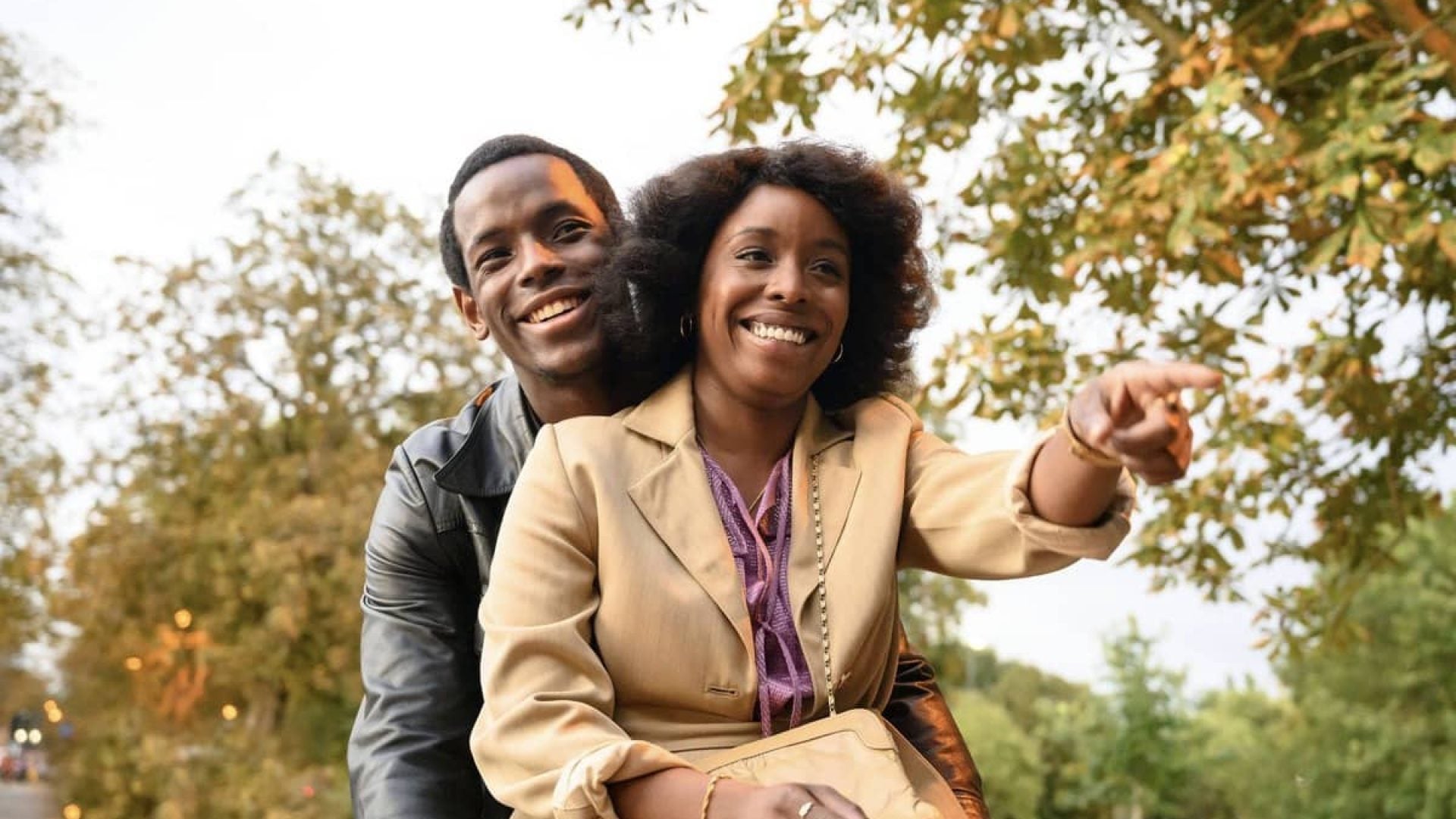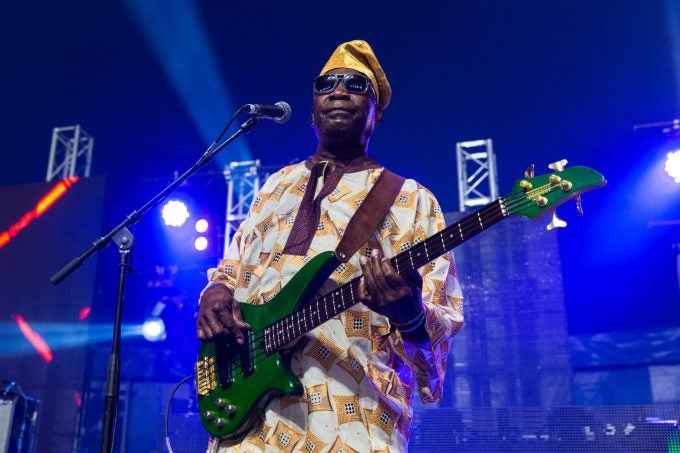 Lovers Rock | Photo Courtesy of Amazon Prime Video By Kevin L. Clark ·November 28, 2020November 28, 2020
Lovers Rock | Photo Courtesy of Amazon Prime Video By Kevin L. Clark ·November 28, 2020November 28, 2020
Writer-director Steve McQueen’s five-part anthology, Small Axe, has already captivated Black cinephiles around the globe. The first two films — Mangrove and Lovers Rock — are wildly different, but it’s the latter that promises to envelope your heart and soul. Undoubtedly one of the best movies of 2020, Lovers Rock is crafted directly from McQueen’s childhood and will transfix you with its evocative vibes.
It is beautifully shot by Shabier Kirchner (Dadii) and writer Courttia Newland (Gamma) balances Dennis Bovell’s melodies with intertwined relationships that shine a light on Micheal Ward (Top Boy) and Amarah-Jae St. Aubyn on-screen dynamic. Set during a single evening at a blues party in 1980s West London, Lovers Rock zones in on the connection and communion Black folx experience among one another. There are too many scenes that will have you shaking your head in awe at just how strong our bonds are.
Thanks to this cast of creatives, Lovers Rock is thrilling in its fluidity and charged in superioraria-label=”witnessing stories (opens in a new tab)” href=”https://www.essence.com/articles/woke-tv-music-supervisors-interview/” target=”_blank”>witnessing stories that stretch toward the hopes of our ancestors. Carrying on that tradition is Dennis Bovell, one of the chief architects of the Lovers Rock sound, and the pen behind two of the films most stunning moments. ESSENCE got a chance to speak with the legendary dub-reggae producer about how Steve McQueen evolved the song meaning behind “Silly Games,” the creativity behind “blues parties,” and learn about his favorite needle drops from the film.
Your history with, with dub reggae and the music in general have gone on for a little bit more than half a century. Can you share with the ESSENCE audience, a little bit about your musical background and how you and Steve hooked up for Lovers Rock?
DENNIS BOVELL:: I’m the grandson of a choir master in the Seventh Day Adventist Church. There was music all around my house as I grew up. My uncles sang, my mom could read sheet music, my granddad taught everyone music, and my grandma played the organ. Music was no stranger in the house. When I moved to London, I had been learning the guitar from my mother’s younger brother for about a couple of years. When I was in Matumbi, we said that we were going to be strictly a reggae band. We became a part of a sound system because singers would come from Jamaica for us to be their backing band.
I got into record engineering and I was looking for someone with the charisma of Diana Ross and the Supremes, but make a new genre, which came to be known as Lovers Rock. Quickly, I would work with different artists from all over — Linton Kwesi Johnson, Carol Sims (now known as Kofi), and Karen Wheeler, who is a member of Soul II Soul — and I would write and play on songs that became the new style of Lovers Rock. This related to Steve McQueen and the film because it represented moments from his childhood. We got together and he asked me to create music that might follow from a song called “Silly Games” I did with Janet Kay.
In the last 40 years, that song has become the premier Lovers Rock anthem. You cannot throw a party without having to play that record, amongst others. Steve wanted me to create the vibes similar to how I did in ‘74, ‘75, up to ‘79, when that record was atop the UK charts. He also scripted that song in the Lovers Rock film, so I grabbed the mantle and just ran with it.
 Dennis Bovell | Photo by Lorne Thomson/Redferns
Dennis Bovell | Photo by Lorne Thomson/Redferns
By doing that, you, Steve and Courtitia Wright did something that is slowly happening more on film — creating scenes not propagated by impending violence. Can you talk about seeing the final cut of the film and what that feeling of seeing pure Black joy and expression was like?
BOVELL: Listen, the “blues parties” were where we used to have our fun as a youth. We would go there on the weekend, get dressed up, meet people, dance all night, and have a good time. The walls and ceilings would be dripping with water. The cops being jealous or looking for trouble made the night go sour, and that’s only because they were always actively involved in breaking up Black people’s enjoyment.
Without spoiling the film, “Silly Games” is part of a great moment where the actors really get to shine. What was your take when you were filming this?
BOVELL: I learned something. I learned from Steve that “Silly Games” was not only about love. It is also about people and their lives. When we did that scene you mention, it took the song into a different meaning. At that moment, it wasn’t a love song any more, you know what I mean? ‘Hey, we’re tired of these silly games that these politicians play. We’re tired of these silly games being played with people’s lives.” Black people have a history of having these parties because the discotheques at the time didn’t cater to Black people. When we decided to create our own entertainment, it became a way to connect with friends and family.
It is that level of connectivity that you were also able to express in the film, Babylon, which you also did the music for, yes? Can you speak about connecting a new generation to the history of dub reggae, blues parties, and your work in particular.
BOVELL: It is always a pleasure to pass on knowledge to anyone — especially the next generation. It isn’t a good thing to go to your grave holding onto your knowledge with nobody able to build upon what you did. That’s selfish! In Babylon, I wrote the music for the film and it was on the fly. I would see the rushes (dailies) for the day’s shooting, then go into the studio with a video player, play the film backwards and forwards, and then decide what tempo I was going to do. In coming up with music, I would record the piece twice as a Jazzterpiece — I recorded a straight reggae version, using Angus “Drummie” Zeb on drums. I then recorded a punk version using Bruce Smith on drums and I got him to play drums on this really rough and tumble version. I edited both versions together at the point where the film was going to turn nasty.
With the film’s improbable success, ESSENCE wanted to revisit the songs that tell the story of Small Axe: Lovers Rock. If you could share some back stories behind some choice songs from the film then that would be greatly appreciated. Up first, is “Hey There, Lonely Girl” by John Holt.
BOVELL: That was always top tune at the dance. You better have a partner when that one comes on or you’re going to be very lonely. This was always a pretty sexy song, but Steve liked that kind of falsetto singing throughout the film. There is another song in the film by Junior English called “After Tonight”. John Holt is the Curtis Mayfield of the reggae and I’ve been listening to him since a youngster. He is truly one of the forefathers of making reggae live in London. To have him sing that tune and for Steve [McQueen] to know it intimately was such a great feeling for me.
Jim Reeves — “The World is Not My House”
BOVELL: The thing about the Caribbean is that you would be surprised to find out how many people there absolutely love country music. I don’t know if it is because it was left behind by the slave master or that the roots of country music being a Black artform resonated with us Carribean folk. But people around the West Indies love Jim Reeves because he was able to speak directly to the people’s hearts.
The last one I got for you when it comes these needle drops is from The Revolutionaries. The song is “Kunta Kinte”.
BOVELL: That kind of tune would spark off extra dancing at any blues party. People would lose their minds when they hear that song. It is a very haunting song that signifies some dangerous stuff about to happen — and that was right when the 12” record came into play. “Kunta Kinte” [by The Revolutionaries] is one of the first extended versions of a record in recorded history. It would play on for about 12 minutes which would let the DJ slip out to the bathroom if need be [laughs].
Here’s the last question I got for you, Mr. Bovell. What do you hope the audience experiences after they see Lovers Rock?
BOVELL: I hope that they will request it again and again on their streaming queues. This is one of those films I hope people will know thoroughly and verbatim. This happened at the screening of Babylon in Brooklyn. Some guys knew the dialogue from the whole film and that, for me, was the sign of a great movie. When people start adopting the roles of the actors from the movie then that is a sign that they enjoyed it truly. You never know, there may be room for a Lovers Rock sequel.
Kevin L. Clark (@KevitoClark) is the curator behind ESSENCE’s The Playlist. You can stream the latest edition starring Juicy J on Apple Music and Spotify.
TOPICS: beauty-inspired movies Black British history Black Love Movies Black Movies small axe Steve McQueen
The post ‘Lovers Rock’—The Story Behind The Music In Steve McQueen’s Tribute To Reggae appeared first on Essence.
